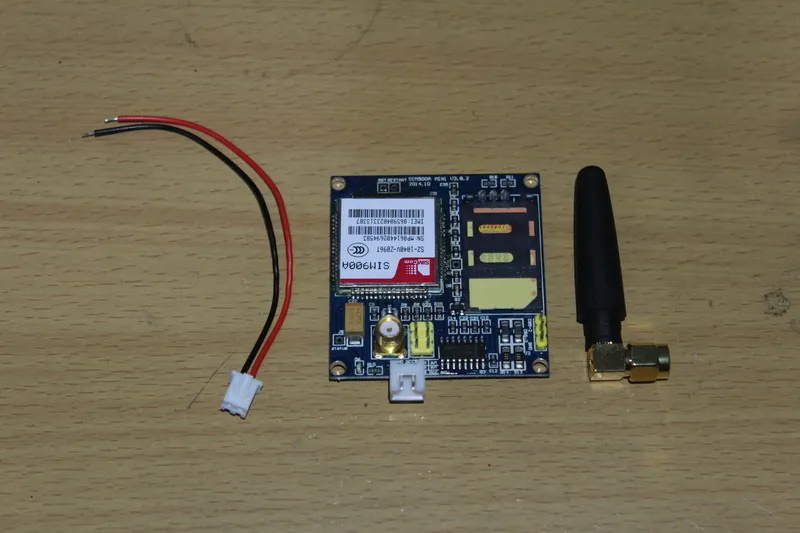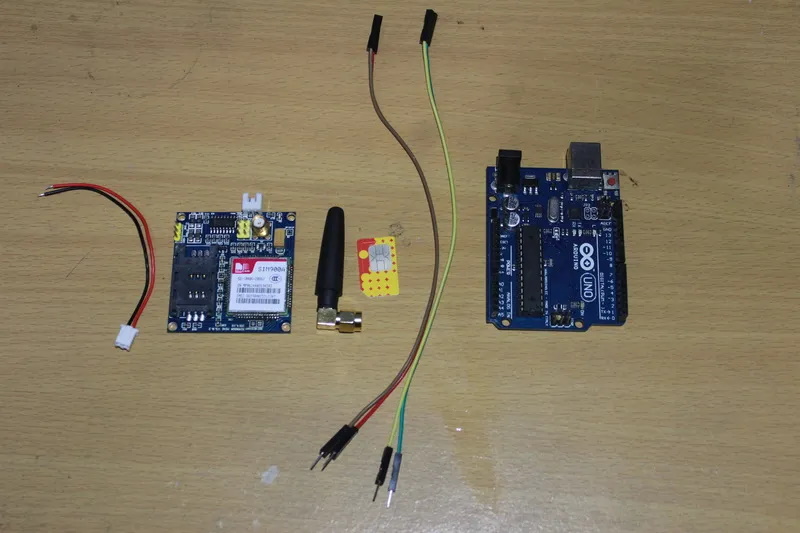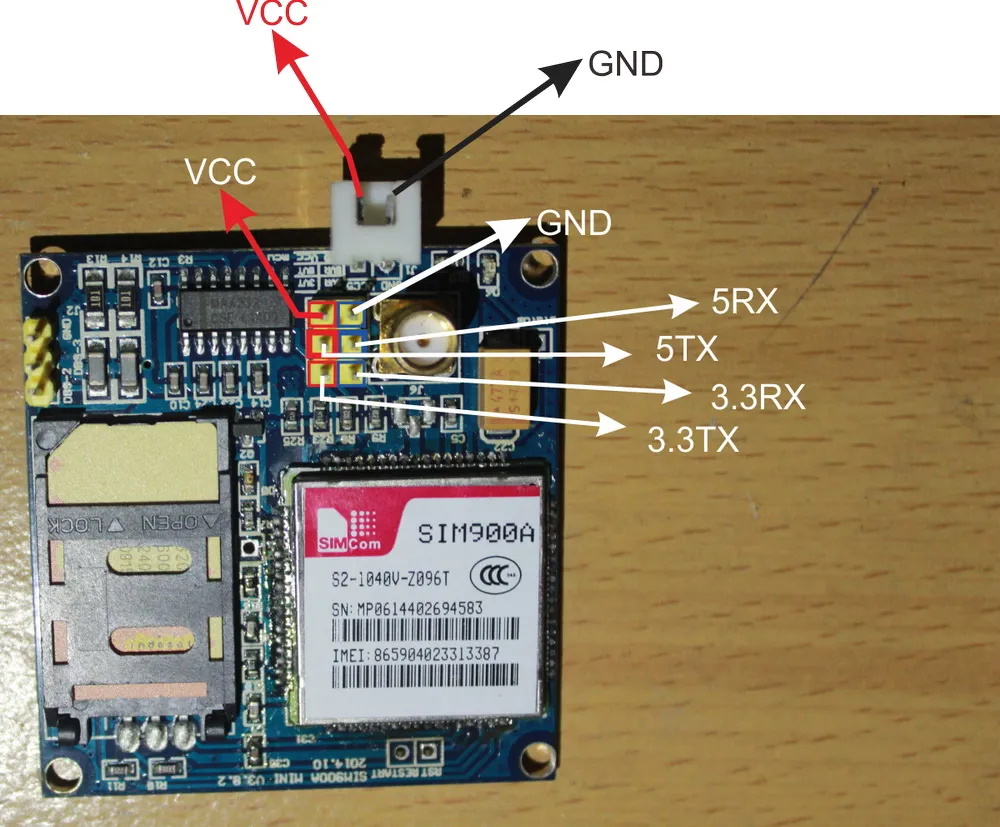SIM900A module

Introduction
SIM900A is a GSM module that function like phone. It can send a message, call a phone number and use GPRS to send data. Here’s the simple feature taken from it’s datasheet.
- Quad-Band 850/ 900/ 1800/ 1900 MHz
- Dual-Band 900/ 1900 MHz
- GPRS multi-slot class 10/8GPRS mobile station class B
- Compliant to GSM phase 2/2+Class 4 (2 W @850/ 900 MHz)
- Class 1 (1 W @ 1800/1900MHz)
- Control via AT commands (GSM 07.07 ,07.05 and SIMCOM enhanced AT Commands)
- Low power consumption: 1.5mA(sleep mode)
- Operation temperature: -40°C to +85 °C
This type can connected to 5V directly, which has provided by arduino. No need external power supply. Other type may need 9V or greater.\
AT Command
SIM900A uses AT command to communicate and control the module. This means if you want to control SIM900A with arduino. The arduino should give an AT Command to control it. AT Command in SIM900A uses Serial port to communicate. As usual, serial needs two pins that is Transmitter (Tx) and a Receiver (Rx). AT command is a command that begin with “AT”.
AT Command sample :
AT+CMGF=1 //Sets the GSM Module in Text Mode
AT+CMGS //Send a message
Parts needed:
- SIM900A
- Arduino UNO
- SIM Card
- 4 male female jumper cable

We just need connect 4 wires to SIM900A module, that is power connection (VCC and GND). And Serial communication (RX-TX). Because we use arduino UNO which is use 5V operating voltage and has 5V logic level (TTL). So we need to connect arduino to 5RX and 5TX like in pinout picture below.

Wiring
Wire SIM900A module to arduino UNO like this :
- Arduino -> SIM900A
- 5V -> VCC
- GND -> GND
- 10 -> TX
- 11 -> RX
evt fout: 0 -> RX and 11 -> TX

Communication Test
If you already connect the module with arduino like in picture above, then this is the time to test communication between module and arduino, to make sure that arduino can give command to SIM900A module. Don’t forget to double check the wiring connection.
In this test, we will use AT Command to communicate with SIM900A module. If we send command “AT” the module should reply “OK”. And if that happen, this means the connection is succesfull. To do this, we need an arduino sketch like below :
#include
SoftwareSerial SIM900A(10,11); // RX | TX
// Connect the SIM900A TX to Arduino pin 10 RX.
// Connect the SIM900A RX to Arduino pin 11 TX.
char c = ' ';
void setup()
{
// start th serial communication with the host computer
Serial.begin(9600);
while(!Serial);
Serial.println("Arduino with SIM900A is ready");
// start communication with the SIM900A in 9600
SIM900A.begin(9600);
Serial.println("SIM900A started at 9600");
delay(1000);
Serial.println("Setup Complete! SIM900A is Ready!");
}
void loop()
{
// Keep reading from SIM800 and send to Arduino Serial Monitor
if (SIM900A.available())
{ c = SIM900A.read();
Serial.write(c);}
// Keep reading from Arduino Serial Monitor and send to SIM900A
if (Serial.available())
{ c = Serial.read();
SIM900A.write(c);
}
}
Upload the sketch above and open Serial Monitor. Don’t forget to use BOTH NL&CR in arduino Serial monitor option.
Test the connection by type “AT” and then enter. If the arduino reply “OK” means your connection is established and working. If still no answer from arduino then check your connection and wiring again.
Since we already success use an AT command to SIM900A module, now we can try another AT command. These are some basic AT command we can use :
Change mode to sms: AT+CMGF=1
Read SMS in text mode: AT+CNMI=2,2,0,0,0
Make a call: ATD+1123456789; //replace with number and country code you like
Disconnect / hangup call: ATH
Receive a phone call: ATA
We will try an complete example how to send and receive message. Use the sketch below :
#include
SoftwareSerial SIM900A(10,11);
void setup()
{
SIM900A.begin(9600); // Setting the baud rate of GSM Module
Serial.begin(9600); // Setting the baud rate of Serial Monitor (Arduino)
Serial.println ("SIM900A Ready");
delay(100);
Serial.println ("Type s to send message or r to receive message");
}
void loop()
{
if (Serial.available()>0)
switch(Serial.read())
{
case 's':
SendMessage();
break;
case 'r':
RecieveMessage();
break;
}
if (SIM900A.available()>0)
Serial.write(SIM900A.read());
}
void SendMessage()
{
Serial.println ("Sending Message");
SIM900A.println("AT+CMGF=1"); //Sets the GSM Module in Text Mode
delay(1000);
Serial.println ("Set SMS Number");
SIM900A.println("AT+CMGS=\"+6281542787536\"\r"); //Mobile phone number to send message
delay(1000);
Serial.println ("Set SMS Content");
SIM900A.println("Good morning, how are you doing?");// Messsage content
delay(100);
Serial.println ("Finish");
SIM900A.println((char)26);// ASCII code of CTRL+Z
delay(1000);
Serial.println ("Message has been sent ->SMS Selesai dikirim");
}
void RecieveMessage()
{
Serial.println ("SIM900A Membaca SMS");
delay (1000);
SIM900A.println("AT+CNMI=2,2,0,0,0"); // AT Command to receive a live SMS
delay(1000);
Serial.write ("Unread Message done");
}
#3, Bak 6.07